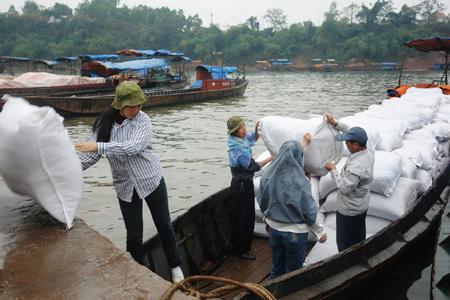
Business people unload imports from Vietnam at a pier in Dongxing city, Southwest China's Guangxi Zhuang autonomous region. [Photo/China Daily]
BEIJING - Prompted by rich resources, favorable locations, and reasonable prices in Southeast Asia, Chinese companies are increasingly investing in projects or financing infrastructure of mining companies for mutual benefits.Big names in the mining and metals sector including Chinalco, Jinchuan and Guangxi have already showed their interest in acquiring local resources and seeking cooperation.
State-owned Guangxi Nonferrous Metals Group is expanding its footprint overseas, especially in Southeast Asia, to acquire more minerals to spur growth.
Li Yangtong, chairman of Guangxi, told China Daily that the company is looking at nickel assets in Indonesia, and has established representative offices in Laos to scout for potash, tin, gold, zinc, lead, copper and antimony projects.
The company sealed six agreements for resource projects overseas worth 5.35 billion yuan ($787 million) on the sidelines of the China-ASEAN Mining Cooperation Summit Forum in September.
This included iron ore and gold projects in Cambodia and a tin venture in Laos.
He also said the company is conducting research on potential mining investments in Myanmar and Vietnam.
Jinchuan, China's largest nickel producer, is looking for overseas nickel resources in Indonesia, the Philippines, Vietnam, and also investing in copper projects in the Philippines, to secure raw materials and to cash in on the growing demand.
Wang Haizhou, president of Jinchuan, said the company will focus on overseas acquisitions in neighboring regions such as Southeast Asia and Central Asia because of lower transportation costs as well as mature projects in developed countries.
The company is currently in talks over a nickel project in Vietnam.
China led the competition in the global resources market last year and has signed a string of deals recently aimed at significantly boosting its raw material supplies.
Ernst & Young said in a report that investors from China, who ranked fourth in the global number of speculators in the first three quarters, may shift focus to new regions this year.
"Mining asset prices in developed countries such as Canada and Australia have been on the rise, which means assets in new mineral rich countries provide great opportunities for Chinese companies," said Ernst & Young.
Investment by Chinese companies in Southeast Asian countries in the resources sector now accounts for a quarter of the country's global resources transaction market - another sign of China's growing financial importance in the region, said Liu Yinan, vice-chairman of China Chamber of Commerce for Metals, Mineral and Chemicals Importers and Exporters.
The Philippines has increased its production volume for metal resources to cash in on what overseas investors are seeking, said Jeremias L. Dolino, undersecretary of the Department of Environment and Natural Resources in the Philippines.
Nickel prices increased 651 percent between 2003 and 2009, while copper increased 141 percent over six years in the Philippines, which has rich resources in gold, copper, chromites and manganese, among other resources.
 Free trade deal lifts businesse
Free trade deal lifts businesse"These countries have advantages of lower transportation costs because of their proximity and they have metals we need," said Qiao Fugui, general manager of the mining sector at Jinchuan. "Since mining resources from developed countries have been priced higher, it's always good for us to look for other new opportunities."
BHP Billiton's $39 billion bid to take control of Potash Corp of Saskatchewan, the world's largest fertilizer-maker, has led to concerns over supplies. China is taking a diverse approach to ensure stable supplies as global demand for the crop nutrient grows.
Laos is one of the countries where the government is supporting Chinese companies in acquiring potash mines.
Thongphath Inthavong, director general of the Ministry of Energy and Mines in Laos, said there are five Chinese companies discussing investment in potash mines there, although they have not yet been brought fully into operation.


